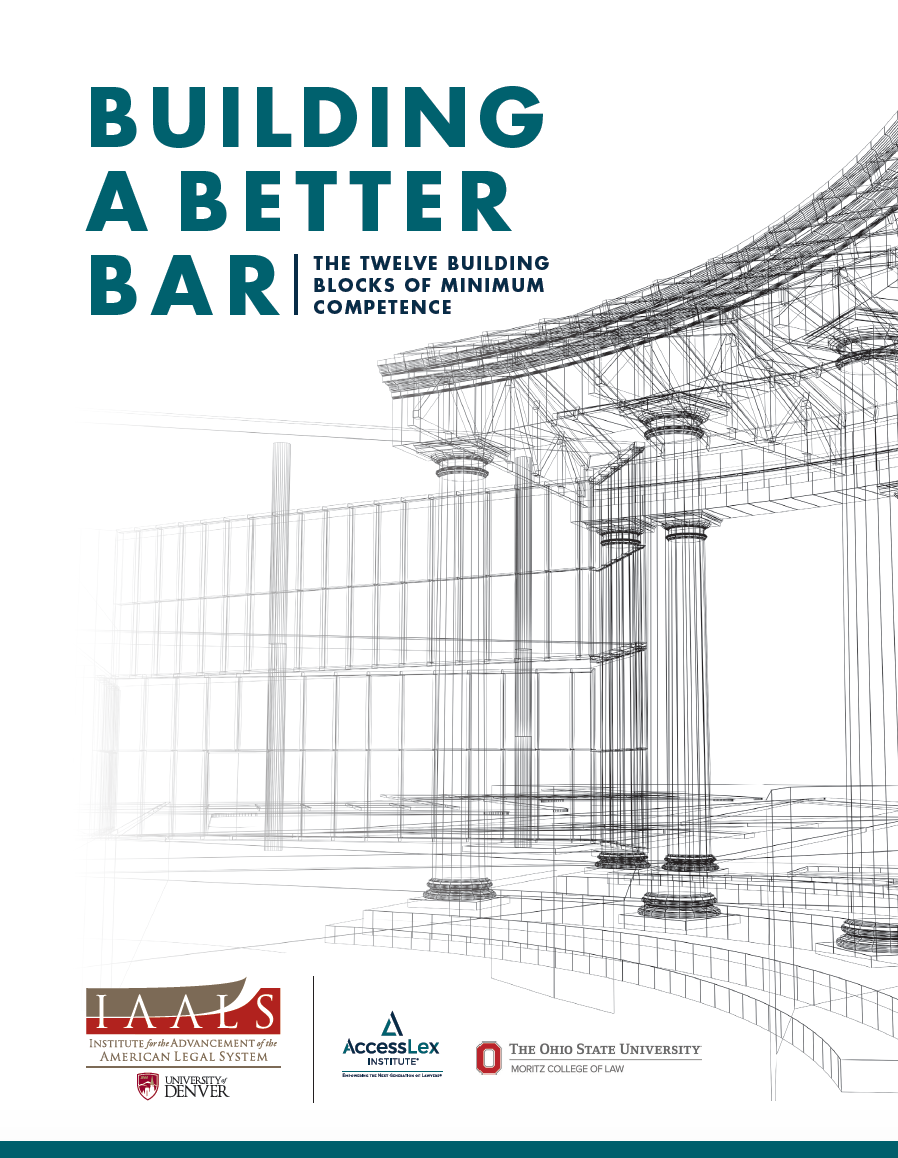IAALS Study Reveals the Building Blocks of Minimum Competence, Recommends Changes to Bar Exam and Lawyer Licensing
Each year, tens of thousands sit for the bar exam nationwide, a final step in demonstrating that new law graduates possess the minimum competence needed to practice law. What exactly minimum competence is, however, has never actually been defined—not by the bar examiners or the legal profession at large. This critical flaw has gone unaddressed for a hundred years, making it impossible to know whether the exam actually assesses what it purports to assess—a glaring flaw for an exam that is supposed to protect the public from unqualified lawyers. This unsupported claim of protection is increasingly distressing when we recall the droves of bar applicants forced to sit for in-person exams this summer and fall in the midst of the pandemic.
 In a first-of-its-kind study, IAALS, in partnership with Professor Deborah Merritt at The Ohio State University Moritz College of Law, has defined the minimum competence that new lawyers need to be qualified to practice law—and provides recommendations for how legal licensing processes must change to be more fair to test takers and to better protect the public. Findings and recommendations from the study were published this month in Building a Better Bar: The Twelve Building Blocks of Minimum Competence.
In a first-of-its-kind study, IAALS, in partnership with Professor Deborah Merritt at The Ohio State University Moritz College of Law, has defined the minimum competence that new lawyers need to be qualified to practice law—and provides recommendations for how legal licensing processes must change to be more fair to test takers and to better protect the public. Findings and recommendations from the study were published this month in Building a Better Bar: The Twelve Building Blocks of Minimum Competence.
The evidence-based definition of minimum competence consists of 12 interlocking components—or building blocks. These building blocks reveal not only what it takes to be a minimally competent lawyer, but how current licensing systems must be improved to reflect what new lawyers say they actually do in practice. That’s why this groundbreaking report also outlines 10 recommendations that courts, law schools, bar associations, bar examiners, and other stakeholders should consider in their efforts to move towards better, evidence-based lawyer licensing.
The 12 building blocks are the product of two years of independent research—funded by AccessLex Institute—including data from 50 focus groups across the country, as well as prior quantitative data on minimum competence. The building blocks are:
The ability to act professionally and in accordance with the rules of professional conduct: New lawyers told us they took their professional responsibility seriously—yet, while these they had studied the rules of professional conduct in law school and for the bar exam, they still struggled to apply those rules in practice and had difficulty navigating unethical or unprofessional behavior by others.
An understanding of legal processes and sources of law: Even after completing law school and the bar exam, new lawyers admitted lacking a basic understanding of key legal, administrative, and legislative processes, as well as alternative dispute resolution channels. Many relied primarily on state or local law in their first years of practice, which is not tested at all on the bar exam (only federal law is).
An understanding of threshold concepts in many subjects: Focus-group members indicated that new lawyers need an understanding of the law as a whole rather than a collection of detailed legal rules—and most were adamant that new lawyers should not rely upon memory, with some calling it “dangerous” and “borderline malpractice.” This calls into question the core of how the current bar exam operates.
The ability to interpret legal materials: New lawyers agreed that being able to interpret legal materials is an essential skill, and to do so properly requires an understanding of the difference between holding and dictum in judicial opinions, the role of precedent, canons of statutory construction, and rules for interpreting contracts, as well as the ability to read carefully and keen attention to detail.
The ability to interact effectively with clients: New lawyers felt overwhelmed by—and unprepared for—the scope of clients they were serving, and this often left them struggling to bridge the gaps between themselves and their clients. Focus-group members revealed that new lawyers need more than just people skills, however; they need the ability to interact with clients in a lawyerly way. This opens the door for legal education and clinical work to have a key role in the lawyer licensing process.
The ability to identify legal issues: Real-life practice once again differed from what new lawyers experienced during law school and the bar exam. Identifying legal issues from actual conversations with clients (rather than superficial issue spotting on exams) was difficult, according to new lawyers, and required them to think critically, understand threshold concepts in a wide range of legal subjects, and interact effectively with clients.
The ability to conduct research: Focus-group members frequently stressed the importance of being able to conduct research—including answering specific legal questions posed by clients or supervisors, checking (or updating) their knowledge of legal doctrine, and locating information about local rules or practices. Once again, memorization isn’t key to new lawyer success; instead, minimally competent lawyers must know where to look for information.
The ability to communicate as a lawyer: Communication skills are key, including the ability to do so concisely, effectively, and in language that clients understand.
The ability to see the “big picture” of client matters: Our focus groups revealed that, oftentimes, new lawyers would get too in the weeds of client matters and struggle to see their clients’ problems at a high level—resulting in weak project management and difficulty figuring out how to guide client matters. Knowing legal rules and processes is one thing, but applying them strategically for clients is another.
The ability to manage a law-related workload responsibly: New lawyers found their workload overwhelming, and noted that failure to manage this workload effectively could irrevocably harm clients. Focus-group member responses indicated that careful time management, meticulous organization, and effective collaboration are essential components of competent practice.
The ability to cope with the stresses of legal practice: Accompanying the stress of a law-related workload is the stress of being responsible for clients, with one focus-group member expressing it was like “the weight of the world.” Being a competent lawyer requires the ability to cope effectively with stress, in order to ensure both attorney well-being and client satisfaction.
The ability to pursue self-directed learning: Many new lawyers were taken aback by the lack of training and supervision they received in their first years of practice, as they navigated new practice areas and acquired new skills on their own, with little to no instruction. In order to represent clients effectively, they took control of their own learning—indicating that ability to self-educate is a crucial component of minimal competence.
The validity of a lawyer licensing process depends not only on understanding the facets of minimum competence outlined in the report, but also on accurately assessing them. When our study participants reflected on how well the bar exam had evaluated the skills and knowledge they needed for their first year of practice, their responses provided five insights for how current bar examination practices must change—such as eliminating closed book exam, imposing more realistic time constraints, and using multiple choice questions sparingly, if ever. The report also explores new opportunities for licensing authorities to work with law schools to ensure they teach toward minimum competence and provide practical experiences that better prepare students to be practicing lawyers. Changing the bar exam alone is not the solution; law schools must be at the table.
Altogether, the report provides an evidence-based framework for the legal profession to improve the licensure process, build trust, and ensure that its members are actually equipped to serve the public.



